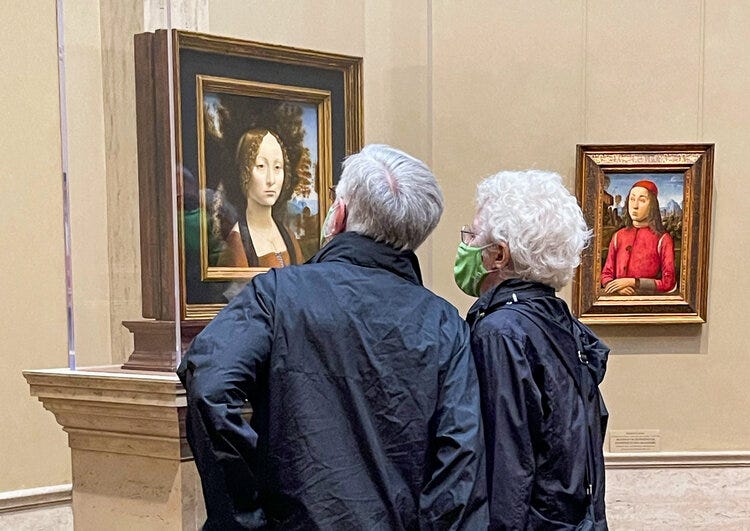Her First Beloved: The Bard (Part 1)
From AngelBio: The Eternal Life of Ginevra de' Benci (1520-2020)
A Burning Bush
Long before the man-machine singularity-- through the artifice getting your head onto a chip, or a chip into your head-- there was the man-art convergence through painting, sculpture, literature, drama, and song.
Immortality has always been a thing-- especially for those who have achieved it, whether by fame, fortune or good looks. You've got heaven on earth and the world at your feet. Why would you want anything to change?
And so our elites in every age have striven to beat their own Great Reset, and stake their permanent claim to deity before the rest of us back in Economy can even get out of our seats.
Whether it's migrating a secure, indestructible, tamper-proof, DNA-exact doppelgänger of yourself to the cloud— or onto a canvas, into marble, an epic, a drama, or a song— the instinct is identical.
Beat the reaper by becoming immortal, whatever the cost.
Whether it's by proven art or error-prone artifice--doesn't matter.
Is it commercially available? Does it meet government safety standards? Can it be used as a reliable energy source? Does not matter.
The science doesn't have to be settled.
Faith is enough.
Like an undiscovered planet detected through its gravitational pull on another heavenly body. Starting with just that, we've managed to build out a model of the universe which then-current technology could not see, hear, touch or travel to.
And by and large we've been proven right.
By seeing things invisible as if they were visible
So is it any wonder, not just at seeing her apparition— as of an angel in a burning bush—- but at feeling the gravitational pull of this very celebrated, very visible yet unknown woman upon five hundred years of culture and history, that some of us should be amazed?
And, like Moses, exclaim:
I will now turn aside, and see this great sight: how this Ginevra de Benci who though long dead yet lives, without beginning or end of days!
Did I say she comes by every century or so? She jumped the gun just a little, but she’ll be forgiven. Not just for the rookie error, but for hitting it out of the park in her first at bat. With a man at the top of his game. Who writes her but refuses to name her. At which she tosses her hair and says,
Let me show you who you are dealing with!
Invitation To The Club Lost In Junk Mail
By 1598, William Shakespeare had nothing left to prove. Despite an obscure, unlettered upbringing and being shotgunned into a marriage at eighteen with a woman nearly a decade his senior, he had risen to become the leading dramatic writer and producer of his day, a favorite of Queen Elizabeth I, the last Tudor, and court dramatist to the first Stuart, James I, of King James Bible fame.
And with earnings rolling in from his Globe Theater across the river, Shakespeare was now a wealthy man, and famous for the two biggest hits that would become his most-staged plays, A Midsummer Night's Dream and Romeo and Juliet.
Immortality was his.
Perhaps it was for the challenge of conquering the literary alpha male of all England and of all time— which you can see when you are freed of its confines— that Ginevra makes her move.
And who could blame her? She had reigned as It Girl of Florence, cultural center of the universe, great and mighty men from near and afar throwing themselves at her feet, when she had suddenly and cruelly been married off to a cloth merchant.
For a for dowry beyond his means but beneath a Medici's, on a midwinter's day, in a private ceremony at the family piazza in Florence, to spend the rest of her days locked in her bedroom, at the doctors, or in a convent.
Now she's back with eternal life and infinite agency, moving in and out of time, writing herself in and out of the story, taking a hand in events as she pleases.
And this time she's not going to settle.
But at the start, at least, it looks like she'll have to.
He Looks At Her… Briefly
Somehow--we've got a couple ideas, but we’ll never know exactly how--Shakespeare gets roped into writing Ginevra's story, which he pulls directly from the Guinevere episode in Canto V of Ariosto's Orlando Furioso, just translated into English by Sir John Harington, under the sponsorship of Queen Elizabeth I.
But while Ariosto's tale of the accusation, death sentence, and rescue of Ginevra are turned by Shakespeare into her humiliation, death and resurrection…
He never once mentions her name!
And all but treats her with disdain:
First, he upstages her story with the brilliantly witty courtship of supporting actors Benedick and Beatrice...
Then he stages the whole thing as a comedy...
And then calls it Much Ado About Nothing.
Not exactly how a supermodel imagines seeing herself up in lights on the London stage.
Say her name. She cannot be outlived. She will not be outloved. She will always outbless.
And That’s All It Takes
But Nevvy the supermodel never seems to mind. In fact, Much Ado does passingly well in production.
And from that point, Shakespeare enters upon the prime of his playwriting career, producing over the next decade the masterpieces which anyone aspiring to write in the English language must first read:
And Then Everything Changes
In 1613, three interesting things happened.
Shakespeare wrote his last plays-- Henry VIII and Two Noble Kinsmen.
The Globe Theater caught fire and burned to the ground.
Much Ado About Nothing was staged at the English court to celebrate the marriage of King James' only daughter Elizabeth Stuart to Frederick V Elector of Palatine of the Rhine in the Holy Roman Empire.
There had to be a reason. There was. And you can almost hear her voice in what happens next:
Say my name. I cannot be outlived. I will not be outloved. I will always outbless.
The Winter King
Frederick and Elizabeth were married in great pomp, and returned to Heidelberg Castle on the Rhine to live happily every after. Until 1618. when the largely Protestant nobility of the neighboring Czech province of Bohemia rebelled against the Catholic Hapsburgs, ruling dynasty of the Holy Roman Empire, and offered Frederick the kingship in return for Bohemia's admission to the Protestant Union, and desperately needed English support.
This would backfire badly, when James I refused to come to the aid of his own son-in-law, choosing despite bitter criticism to keep England out of the hot mess on the Continent. With unpaid mercenaries and not even a coalition of the unwilling, Protestant Czech forces were quickly crushed by imperial Catholic troops in the Battle of White Mountain on November 8, 1620, launching one of the longest sustained forever conflicts in modern history, the Thirty Years’ War.
Frederick would be thrown out of Bohemia, evicted from his own Rhineland Palatinate, and left to wander in exile until his death in 1632. He would be ever after known as The Winter King, for the dashed hopes that characterized his brief rule.
Following Frederick's demise, his Winter Queen, Elizabeth Stuart, would lobby tirelessly across the Continent to have the Palatinate restored to her son Charles Louis. A brief rekindling of the line with the Peace of Westphalia in 1648 would prove nugatory, and Elizabeth would retire to England to pass away in 1662, believing her efforts had come to nothing.
Right Man, Right Place, Right Time, Right Move
Others did not fare as badly during the war, however. Take the House of Liechtenstein, a prominent Austrian Protestant family that read the prevailing winds and converted to Catholicism in 1599, gaining favor from the Holy Roman Empire's ruling Hapsburg family, who elevated their pater familias Prince Karl I von Liechtenstein (1569–1627) to head of the emperor’s household.
During the Bohemian Rebellion, Karl I sided unequivocally with Hapsburg Emperor Ferdinand II against those of his former faith. After the victory at the Battle of White Mountain, Karl I was appointed proconsul and vice-regent of Bohemia, and entrusted with arresting and executing those of his former faith, followers of the banished Winter King, a plum assignment that expanded his possessions considerably through the acquisition of confiscated rebel estates.
Following Karl's death in 1627, his principality was made hereditary, and passed to his son Karl Eusebius, who would use the plundered wealth of the Protestant subspecies to finance the Liechtenstein Princely Collections.
And among his very first acquisitions would be Leonardo da Vinci's portrait of Ginevra de' Benci.
Seeing Things Yet Unseen
But all was not lost for England. While Elizabeth Stuart's hopes for her son restoration to their beloved Heidelberg would never come true, she would be rewarded beyond her wildest dreams for a faith in things yet unseen, when her grandson by her youngest daughter Sophia would be crowned in 1714 as King George I of Great Britain, establishing one of the greatest dynasties ever to rule.
The House of Hanover would preside over one of the greatest economic expansions of all time, until the sun never set on the British Empire. They would oversee the Industrial Revolution, the American Revolution, and the peaceful transition of their nation from absolute to constitutional monarchy. Their line would end almost two hundred years later, passing to the House of Windsor in 1910.
All For A Comedy That Never Says Her Name?
You cannot outbless me, for I will not be outloved
But wait-- there's more!
The House of Hanover, it turns out, descends from an ancient Bavarian dynasty known as Welf, one of whose branches formed half of the Guelf (Welf)-Ghibelline rivalry that dominated the politics of medieval Italy.
One of the prominent Guelf strongholds was the city-state of Florence. And one of its most ardent partisans was Dante Alighieri, poet of Inferno, that famous first book of The Divine Comedy.
In Divine Comedy's second book Purgatorio, Dante laments the collapse of civil order in the Italian lands of the former Holy Roman Empire, blaming two warring and dysfunctional families whom he sees responsible for Italy's moral and spiritual decline in the thirteenth and fourteenth centuries-- the Montecchi and the Cappelletti.
Better known to us as the Montagues and Capulets.
Say her name. She cannot be outlived. She will not be outloved. She will always outbless.
Harvey Oxenhorn, is a cybersecurity consultant, founder of Malwords Weekly, and author of the upcoming book, Biography of an Angel: The Eternal Life of Ginevra de’ Benci (1520-2020). He writes The Five Stages of Unf*ck, Red Pill Journey to January 2.0. , also on Substack. Follow him on Gettr, Gab, @HarveyOxenhorn, and on Twitter @HarvOxenhorn



















